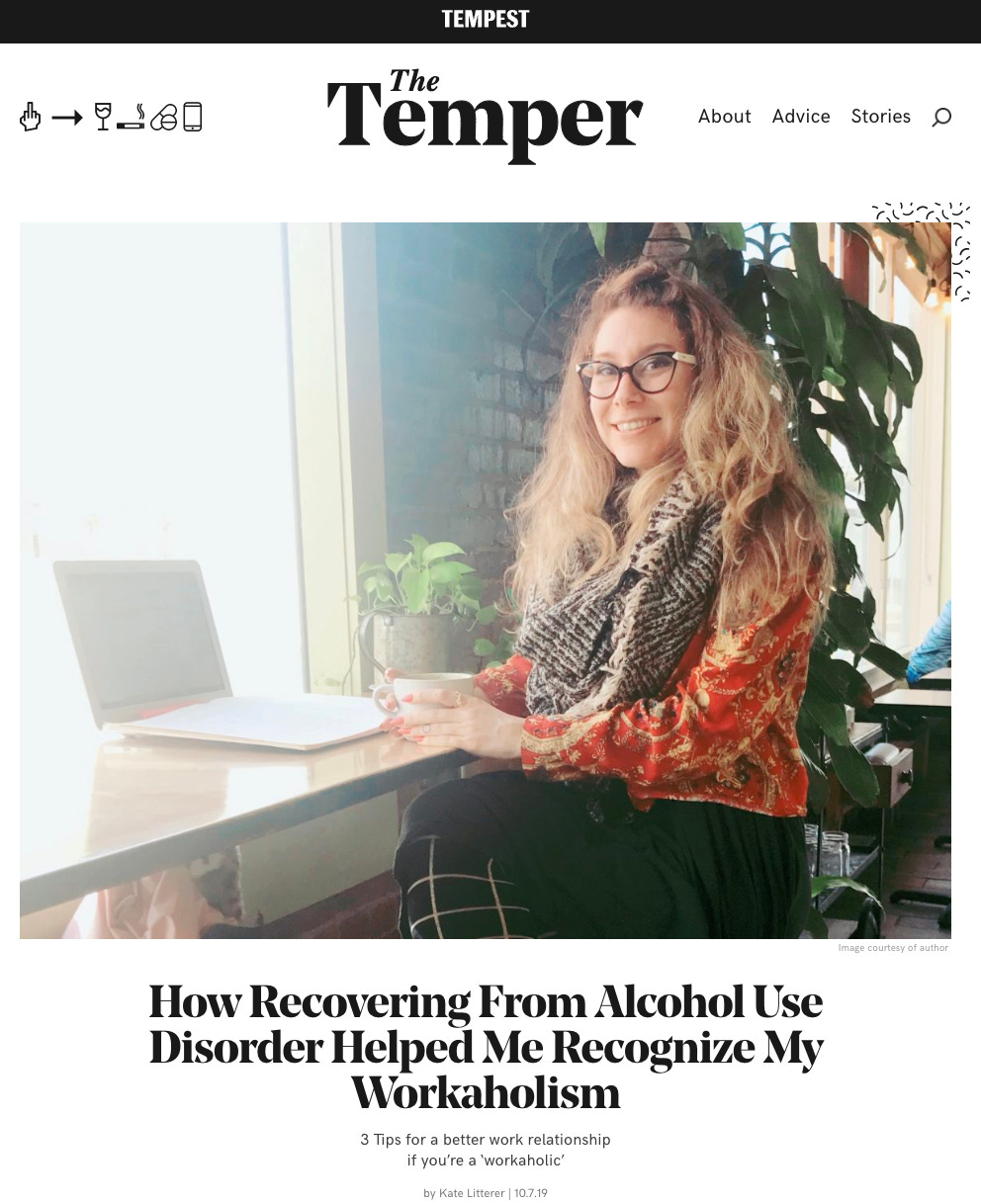You can listen to an audio version of this newsletter above. Please note that this is unedited and I’m recording in my home office, so you may hear some meows, raindrops, or traffic in the background.
If you’re new to my writing, I identify as a recovering alcoholic. This week is my “Soberversa-week” because Friday the 17th I’m celebrating being 10 years sober (!!!) and I’m looking forward to sharing a post with you that day where I’ll dive more into what I’ve learned about myself in the last 10 years. Today I’m talking about how recovering from workaholism is a continual process.

The idea for this post came to me a few weeks ago when I caught myself doing sneaky productivity while my spouse, Kris, was out of town on a business trip.
Wait, what’s “sneaky productivity”?
Sneaky productivity is a term I use to describe hiding your workaholism from others. Bryan E. Robinson, the author of Chained to the Desk: A Guidebook for Workaholics, Their Partners and Children, and the Clinicians Who Treat Them, admitted in his podcast interview with Alanis Morissette (yes, that Alanis!) that he did his own sneaky productivity on vacation with his family, hiding it in his car and waiting to work until his family was napping. Robinson defines workaholism as “an obsessive-compulsive disorder that manifests itself through self-imposed demands, an inability to regulate work habits, and overindulgence in work to the exclusion of most other life activities” Chained to the Desk, p. 3).
Culturally, workaholism is a complicated term. We often throw it around as a joke (you can buy a novelty WORKAHOLIC desk sign on Etsy for $14.99) or a flex (“I’ll sleep when I’m dead”). In the field of knowledge work, particularly in academia, being a workaholic is often normalized, or worse, praised. I’m sure I’ll talk more about that in the future, but for now…
Back to my sneaky productivity story from a few weeks ago.
I recorded the following notes that day, which I’ve since spruced up and cited.
I’ve been working since 10am. I started my workday by editing a workshop presentation for a couple hours. Then I did some writing, some digital file organization, and around 3pm I transitioned to updating the newsletter subscription link on every one of my blog posts since 2018.
My work hours are technically 10am-4pm, but it’s now 5:30pm. My partner is out of town for a business trip and won’t home around 11pm. (Can you guess where this is going?)
It’s the perfect night to make my comfort meal (gluten-free chicken fingers and rosemary french fries), do a little face mask, maybe watch the new Enola Holmes movie, but instead I’m pushing myself to finish editing every single newsletter link in every single blog post.
I recognize that I’m doing sneaky productivity, which means my workaholism is flaring up. So, I’m telling on myself in these notes. Here’s a public admission from me and a lesson for us all: recovering from workaholism is an ongoing process.
I wrote a piece for The Temper a few years ago called “How Recovering From Alcohol Use Disorder Helped Me Recognize My Workaholism.”

In it, I wrote,
I often say that the switch in my brain that should tell me when I’m sated with alcohol — the one that helps other people stop drinking after they’ve had their socially acceptable two glasses of wine at their friend’s art gallery opening — is busted.
As a person in recovery, I’ve chosen to abstain from alcohol.
As a productivity researcher, I know which rules and skills will help me set “healthy” boundaries around my work. But today, on my blog-post-update-athon, I can feel the dopamine scratching at the door in my brain—like, this is a physical feeling!—and my smug first thought was “Haha, Kris isn’t here, so no one will know if I binge these blog posts. Man, it’s gonna feel so good when I finish these blog posts.”
Apparently I still resonate with my quote I wrote in the article: “Unlike drinking, which I can choose to abstain from, I consistently swim against the seductive current of workaholism.”
It’s now 5:51pm. I still want to finish the blog posts, but writing this up helped me put a little distance between myself and the false urgency I was caught in. I don’t feel 100% great about postponing the edits, but maybe that’s a part of recovering: sitting with the discomfort and making new choices over and over.
I’ll leave us with this quote from addiction expert and physician Gabor Maté,
Passions can be very consuming of time and energy, but they also feed your soul, your sense of being alive, your feeling of wholeness as a person. Addictions provide fleeting pleasure or gratification, but never leave you satisfied.
My current new choice: shutting my laptop for the night, walking to the kitchen, and turning on the oven to make some chicken fingers, which I’m certain will satisfy me.
If you want to read more of my writing on workaholism, check out these blog posts:
Curiosities
This section of my letters is for things that made me say “hmmm” or “wow!” recently.
I’ve been on a big You’re Wrong About kick. If I were still teaching college courses, I would assign You’re Wrong About podcasts in my syllabus.
I did a guest lecture about my Lisa Ben research for a class at Montserrat College of Art and I have to say: I will never tire of talking about Lisa Ben, queer magazines, and how Ben’s writing/music pushed back against anti-homosexual rhetoric in Los Angeles in the 1940s-1960s. If you teach a course on any of these topics and would like me to guest lecture about my Ben research, shoot me an email at kate@katehenry.com.
For Your Consideration
Follow me on Instagram
My offerings: 1-on-1 Coaching and workshops and IPSP
Sign up for the waitlist for Perceptible Progress: A Goals Course
Order my book, Tend to It: A Holistic Guide to Intentional Productivity
Listen to my podcast interviews
Take care and talk soon,
Dr. Kate









Congrats on 10 years sober!!
It’s really important to connect different kinds of addiction. This is a beautiful post -- so personal yet well researched.
I definitely am susceptible to workaholism. Not living in America anymore helped a bit; I just found the environment so competitive -- you were a better person, it seemed, if you had done a bunch of work on the weekend. (I have found it with other American colleagues abroad, too.) But of course, you can simply disengage with that culture if you choose! Becoming an independent writer/researcher has given me bouts of this again. Like you describe, it can be hard to keep boundaries. I try using work timers and setting the limit when I pick up my son, but it’s still not easy. Even if we enjoy the work, we have to step away. And maybe it’s about how we value ourselves. FOur Thousand Weeks by Burkeman really helps me consider that time dynamic. Thanks for this really useful post :)
This post is so helpful! My writing group and I continually have this conversation about our relationship to work and productivity! I’m totally going to introduce them to “sneaky productivity”--such a useful term!